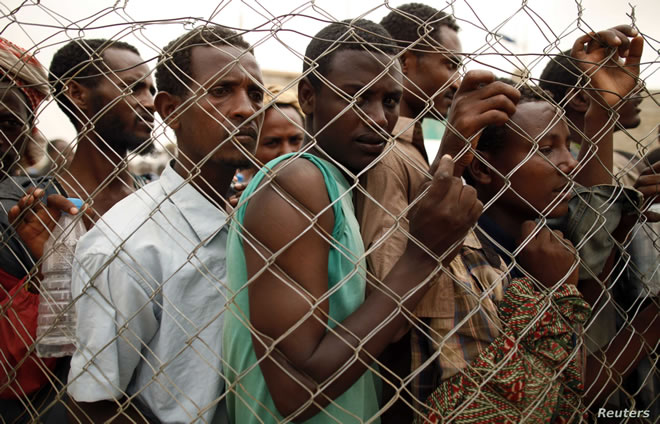
By Birhanu Fikade
Saturday May 9, 2020

Ethiopia migrant workers seeking jobs in Saudi Arabia are being turned back on March 16, 2012, in Haradh, a town in western Yemen near the site where the Saudi government is erecting a fence along the border. (Reuters)
With global fear mounting as the COVID-19 pandemic is taking its toll all over the world, vulnerable Ethiopian migrants in the Middle East, where some 220,000 live, are facing deportation in the remaining months of 2020, while thousands are feared to be potential targets of flash floods, with 110,000 victims already been displaced.
The World Food Program (WFP) reported likely deportations of thousands of Ethiopians, while the National Disaster Risk Management Commission (NDRMC) revealed that a series of heavy rains has affected thousands of citizens. Damena Darota, deputy commissioner of NDRMC said on Wednesday that in April alone, flooding and landslides had affected many households. Some 220,000 people living in the Southern Region, Somali, Afar, and in Dire-Dawa have fallen victim to the rains, while close to 110,000 people have been displaced.
Debebe Zewde, Public Relations Director of NDRMC told The Reporter that this May, some 21,000 more people are exposed and likely to be affected by the pouring rain, and feared that some 19,000 will be displaced.
The belg rains that usually comes during the months of March, April and May helps semi-pastoralist areas and farmers. This year’s rains have caused serious damages and Debebe said that four individuals have died in Dire-Dawa as a result of abnormal rains.
On April 25, according to Debebe, 53 homes have been fully destroyed and 212 homes have been partially damaged. This incident has affected 397 households leaving 1,985 families in need of food assistance.
The next day, on April 25, the heavy rain in Jinka town in the Southern Region, a river overflow inflicted damages on infrastructure and had swept away livestock. A 2 kilometer wide crack had also been created in Silte Zone in the Southern Region.
Moreover, 34,500 people have been affected, when the flood devastated all of the Shinelle Zone localities of Somali Region. The Regional government has reported that some 1,200 livestock including goats, camel and donkeys had been swept away by the flood. More than 3,000 hectares of vegetables and crops had also been destroyed and 200 water pumps swept away.
The abnormal rain is further expected to affect the Southern Region together with Somali, Dire-Dawa, Oromia, Amhara, Afar, Tigray, Harari and Addis Ababa, are on high alert for fresh floods in the coming weeks. Debebe said to withstand the impacts, NDRMC has prepared food and non-food items and shelters to assist victims.
Adding insult to injury, the WFP situation report issued early this week, highlighted that some 220,000 returnees and deportees are expected to arrive in Ethiopia due to the spread of COVID-19 in the Middle East. But more is yet to come, as desert locust infestation spreads and a second generation of newly hatched, consuming some 350,000 metric tons of agricultural produces so far. It is projected that the locust will remain until the coming October. Debebe mentioned the required financial amount to minimize the impact of the disasters. However, WFP outlined a figure close to USD 220 million in response including COVID-19 and logistics is required for the coming six months.